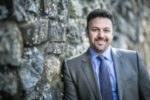By Rabbi Jason Nevarez
Times of San Diego

(Photo: Beth Israel Quarterly)
SAN DIEGO — One Wednesday morning, my son walked into his social studies class, only to find a large swastika drawn in thick black ink on his desk. His teacher immediately responded to the incident, which was quickly added to the growing list of antisemitic incidents throughout the district in those weeks and months.
June 2021, two years later, middle schoolers searching TikTok for dance videos find themselves flooded with flashy, persuasive videos, noting that Jews are criminals. Social media influencers are tweeting that the recognition of Israel’s right to exist is “inherently evil.”
The Anti-Defamation League’s analysis of Twitter in the days following the recent outbreak of violence in Israel showed that at least 17,000 tweets used variations of the genocidal phrase, “Hitler was right.”
The recent weeks have been incredibly painful, perhaps some of the worst in our collective Jewish memory. Israel’s necessary response to the rockets coming from Gaza have caused great pain and distress for those in the region and around the globe.
But then came the daily vile antisemitic attacks on Jews, both verbal and violent locally and across the United States. Jews have been singled out for assault in restaurants and on streets and berated on social media platforms; synagogues have been vandalized and children have been harassed in school.
Any of the above would be enough to hold as a society. Yet, it feels to me that we, as a Jewish community, are holding most of it alone.
Our tradition calls upon us to be pursuers of justice whenever and wherever we are called. Throughout my rabbinate, I have walked the talk of this sacred mandate, often in fellowship with many non-Jewish faith partners. From the Muslim country bans to issues of immigration, race and LGBTQ rights, we have stood shoulder to shoulder in support of these communities — gathering, marching, educating, and praying for change.
You can imagine my shock when the recent attacks on Jews in LA and NYC, coupled with the surge of uncloaked violent antisemitism were not enough to elicit even one response from my many non-Jewish friends and faith partners. Their silence has been deafening.
I understand the reticence of many regarding the situation in Israel and Palestine — it’s a complex narrative that, if new in understanding its historical nuance, can be challenging to respond to in kind. People can educate themselves and debate their respective positions on the issue, but there is no debating American Jews as targets of unprecedented, venomous hatred, which is where the sting of their silence is felt most.
Yet, their absence, in both written and spoken form, became a reminder for me that anyone of conscience can offer their support and speak out.
Whether in Rwanda, Syria, Palestine, or here within our Black, Muslim, LGBTQ or AAPI communities, as a Jewish community, we spoke out and took action, regardless of who was by our side.
In 2018, many of my non-Jewish faith partners stood with us after the massacre at Tree of Life Synagogue in Pittsburgh, where 11 Jews were murdered. One year later, they stood again after the attack at Chabad of Poway. In this latest wave of anti-Jewish violence, where there thankfully haven’t been any Jewish fatalities to date, I ask the question: must Jews shed blood for others to shed tears, or even care?
Pastor Martin Niemoller, a prominent Lutheran Pastor in Germany, believed that Germans had been complicit through their silence in the Nazi imprisonment, persecution, and murder of millions of people. He expressed his powerful conviction in the following quotation now emblazoned on the lobby walls of the U.S. Holocaust Memorial Museum in Washington:
First they came for the socialists, and I did not speak out — because I was not a socialist.
Then they came for the trade unionists, and I did not speak out — because I was not a trade unionist.
Then they came for the Jews, and I did not speak out — because I was not a Jew.
Then they came for me — and there was no one left to speak for me.
The children of Abraham….so many of us fall into that lineage. Yet, that pedigreed point of connectedness is often forgotten, tarnished by painful rhetoric and the unknowingness of “the other.”
There is no more time to wax painful rhetoric, but there is still time for our non-Jewish friends to reach out to their Jewish friends, organizations, and institutions, even just to see how we are doing.
Now is the time when we must know and learn from the other, and call upon our community activists, business executives, faith leaders, public figures, social media influencers, and fellow San Diegans to speak out against antisemitism. As Niemoller reminds us, we must do our part to speak out because antisemitism may start with the Jews but it never ends with them.
*e
Jason Nevarez is the hsenior rabbi and spiritual leader of Congregation Beth Israel, the largest Jewish congregation in San Diego and the oldest in Southern California. This article is republished from Times of San Diego under auspices of the San Diego Online News Association